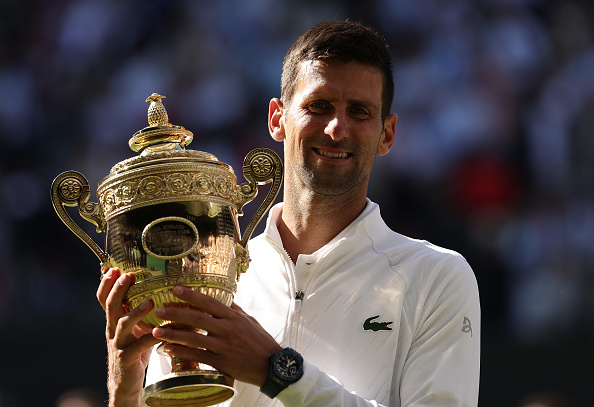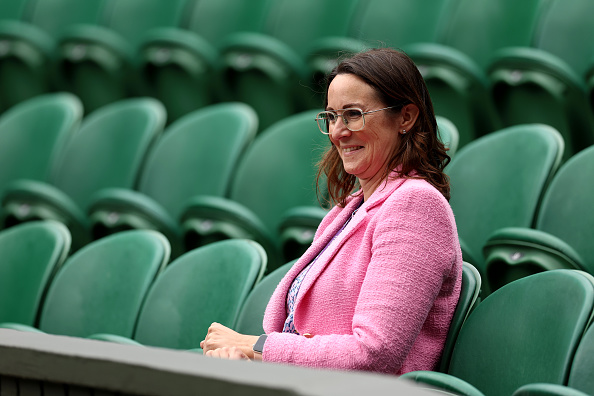Sally Bolton interview: Wimbledon CEO on taking the Championships to the US

Wimbledon CEO Sally Bolton on growing the Championships’ presence in the US, how it chooses its partners and its unique business.
In SW19, there is no mistaking when the Wimbledon Championships are in full swing. Thousands of tennis fans descend on the All England Club; the air is thick with the scent of grass, Pimm’s and strawberries; and you might even bump into a player in the local pub.
Now, organisers are hoping to recreate the Wimbledon buzz 3,500 miles away with The Hill in New York, a fan zone in Brooklyn Bridge Park which will show action from the tournament on a big screen and serve up quintessential British fayre against Manhattan’s iconic backdrop.
The Hill, which debuted last summer and has expanded for this year, is part of a concerted push into the US market which also includes a new sponsorship deal with Barclays, who share similar transatlantic objectives, says Sally Bolton, chief executive of Wimbledon organisers the AELTC.
“As a global brand already, we have an ambition to continue to advance the opportunities for people to enjoy Wimbledon,” Bolton told City A.M.
“We think we’ve got a really good foothold in the US. But we also think there is plenty of untapped potential there to invite more people to enjoy the fantastic experience of Wimbledon.
“Of course many of those people will never come here on site, so we took a tiny piece of SW19 to Brooklyn Bridge Park and created a viewing experience with a big screen over the finals weekend to give people in New York a taste.
“That has been really well received. We will look to other markets internationally where we can take a piece of the Championships.”
Pushing Wimbledon’s appeal in the States can drive more value for sponsors and broadcasters. The latter contributes more than half of the club’s £347m revenue and the AELTC recently agreed an improved 12-year contract with US partner ESPN.

The AELTC could rake in far more than the estimated £50m it derives from sponsorships with blue-chip brands which also include IBM, Ralph Lauren and Jaguar. New this year is a tie-up with online game Fortnite, although there is no hurry to expand the suite of partners.
“Part of maintaining the sanctity of a brand not just in the UK but globally is thinking really carefully about the people who you partner with. People are judged by the friends that they keep and I think that brands are no different,” says Bolton.
“We call them partners for a good reason – it’s not just a commercial transaction for us and them, it’s genuinely a partnership where we have shared goals, a shared set of values, and we believe that we can work together on particular initiatives.
“Barclays, which is one of our new partners this year, is a great example of looking at the US market. They and we have a real ambition to grow our audience and enhance our brand properties in the US market, so we’re going to work very closely with them to do that.
“For us it’s not about quantity, it’s definitely about quality and partnering with brands that share our values and ambitions.”

For Wimbledon, expansion in a more literal sense is the priority. Its plans to bring the qualifying tournament on site and build a third show court on land across the road will go before Merton Council later this year. The hope is that the project will be complete by 2030 or 2031.
“Of course there are some significant benefits for the future of the Championship – it’s about us retaining our position at the pinnacle of the sport,” says Bolton. “But equally important are the community benefits that we want to give back, especially to those who live locally: opening up a new public park on land that has not been accessible for over 100 years now.”
Wimbledon’s status as a member’s club whose profits are mostly reinvested in tennis via a dividend to the Lawn Tennis Association puts it in a unique position. It makes money but none of that goes to shareholders, meaning it is not a target for private equity or sovereign wealth.
“We haven’t had any approaches. It’s a subject that everybody is talking about in sport but it’s not something that we’re engaged with,” Bolton says.
“We haven’t really had to cross that bridge. We are a successful business and organisation and we have the funds that we need to deliver the ambitious plans that we have. So it’s not really a consideration.”
